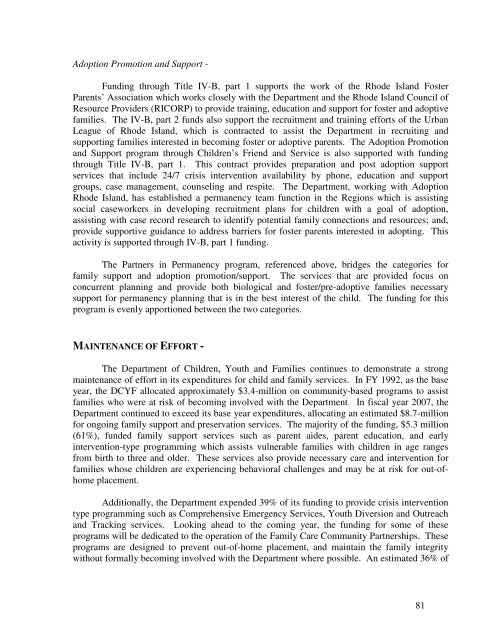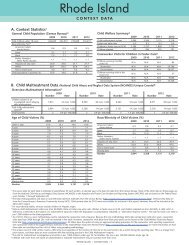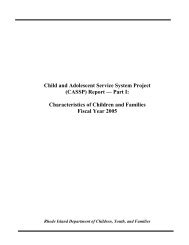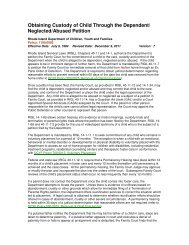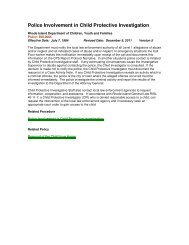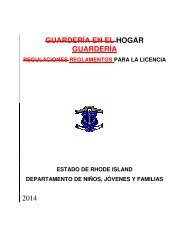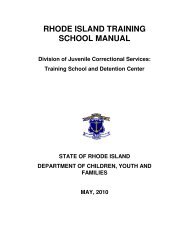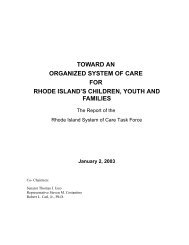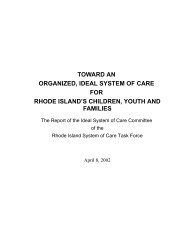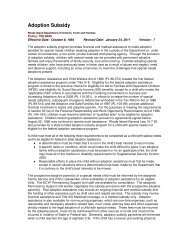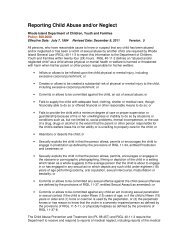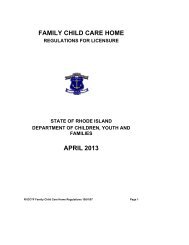CFSP 5 Year Plan - RI Department of Children, Youth & Families
CFSP 5 Year Plan - RI Department of Children, Youth & Families
CFSP 5 Year Plan - RI Department of Children, Youth & Families
You also want an ePaper? Increase the reach of your titles
YUMPU automatically turns print PDFs into web optimized ePapers that Google loves.
Adoption Promotion and Support -<br />
Funding through Title IV-B, part 1 supports the work <strong>of</strong> the Rhode Island Foster<br />
Parents’ Association which works closely with the <strong>Department</strong> and the Rhode Island Council <strong>of</strong><br />
Resource Providers (<strong>RI</strong>CORP) to provide training, education and support for foster and adoptive<br />
families. The IV-B, part 2 funds also support the recruitment and training efforts <strong>of</strong> the Urban<br />
League <strong>of</strong> Rhode Island, which is contracted to assist the <strong>Department</strong> in recruiting and<br />
supporting families interested in becoming foster or adoptive parents. The Adoption Promotion<br />
and Support program through <strong>Children</strong>’s Friend and Service is also supported with funding<br />
through Title IV-B, part 1. This contract provides preparation and post adoption support<br />
services that include 24/7 crisis intervention availability by phone, education and support<br />
groups, case management, counseling and respite. The <strong>Department</strong>, working with Adoption<br />
Rhode Island, has established a permanency team function in the Regions which is assisting<br />
social caseworkers in developing recruitment plans for children with a goal <strong>of</strong> adoption,<br />
assisting with case record research to identify potential family connections and resources; and,<br />
provide supportive guidance to address barriers for foster parents interested in adopting. This<br />
activity is supported through IV-B, part 1 funding.<br />
The Partners in Permanency program, referenced above, bridges the categories for<br />
family support and adoption promotion/support. The services that are provided focus on<br />
concurrent planning and provide both biological and foster/pre-adoptive families necessary<br />
support for permanency planning that is in the best interest <strong>of</strong> the child. The funding for this<br />
program is evenly apportioned between the two categories.<br />
MAINTENANCE OF EFFORT -<br />
The <strong>Department</strong> <strong>of</strong> <strong>Children</strong>, <strong>Youth</strong> and <strong>Families</strong> continues to demonstrate a strong<br />
maintenance <strong>of</strong> effort in its expenditures for child and family services. In FY 1992, as the base<br />
year, the DCYF allocated approximately $3.4-million on community-based programs to assist<br />
families who were at risk <strong>of</strong> becoming involved with the <strong>Department</strong>. In fiscal year 2007, the<br />
<strong>Department</strong> continued to exceed its base year expenditures, allocating an estimated $8.7-million<br />
for ongoing family support and preservation services. The majority <strong>of</strong> the funding, $5.3 million<br />
(61%), funded family support services such as parent aides, parent education, and early<br />
intervention-type programming which assists vulnerable families with children in age ranges<br />
from birth to three and older. These services also provide necessary care and intervention for<br />
families whose children are experiencing behavioral challenges and may be at risk for out-<strong>of</strong>home<br />
placement.<br />
Additionally, the <strong>Department</strong> expended 39% <strong>of</strong> its funding to provide crisis intervention<br />
type programming such as Comprehensive Emergency Services, <strong>Youth</strong> Diversion and Outreach<br />
and Tracking services. Looking ahead to the coming year, the funding for some <strong>of</strong> these<br />
programs will be dedicated to the operation <strong>of</strong> the Family Care Community Partnerships. These<br />
programs are designed to prevent out-<strong>of</strong>-home placement, and maintain the family integrity<br />
without formally becoming involved with the <strong>Department</strong> where possible. An estimated 36% <strong>of</strong><br />
81


